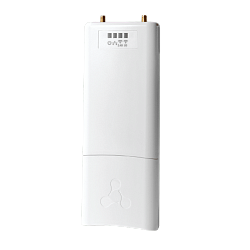Subscribe
You will receive on your e-mail all the news about the product, updating software and documentation!
Wireless access point WOP-2L
Overview
Specifications
Reviews
Key features
-
High-performance solution based on Realtek chipset
-
Dual band access point with support for 802.11ac
-
Radio interface with MIMO 2x2 support
-
PoE+ power supply (IEEE 802.3at)
-
Up to 40 clients per an access point
-
Up-to-date authentication and encryption means
WOP-2L provides high-performance and safe wireless connection that combines numerous features and services which are necessary for convenient network access in crowded areas. WOP-2L is a proper solution for organization of wireless networks in various climatic conditions: in a wide range of operating temperatures and high humidity (in parks, at factories, stadiums, etc.). The device provides an optimal platform for communication networks organization in suburban settlements and remote locations.
Scalability
The WOP-2L wireless access point is an up-to-date flexible solution that allows you to change the network coverage in order to increase the quantity of serviced mobile devices. Due to high performance hardware platform, scalability features and easy-to-use interface , it is possible to set up IT infrastructure simply and fast.
Wireless connection
Due to support for IEEE 802.11n/ac standards the WOP-2L access point provides 300 Mbps (at 2.4 GHz) and 867 Mbps (at 5 GHz) data rates.
Scalability
The WOP-2L wireless access point is an up-to-date flexible solution that allows you to change the network coverage in order to increase the quantity of serviced mobile devices. Due to high performance hardware platform, scalability features and easy-to-use interface , it is possible to set up IT infrastructure simply and fast.
Wireless connection
Due to support for IEEE 802.11n/ac standards the WOP-2L access point provides 300 Mbps (at 2.4 GHz) and 867 Mbps (at 5 GHz) data rates.
The use of MIMO technology and embedded omnidirectional antennas makes WOP-2L a universal solution for corporate networks construction.
Security
WOP-2L provides personal data protection and corporate environment security due to the support for modern authentication technologies. Particularly, it uses a dynamic key that is unique for each active user station.
Performance
The high-performance Realtek processors are used in the devices in order to provide reliability and high data processing rates.
Power supply
The PoE+ technology makes the installation possible practically at any place regardless of the power supply location, thus allowing for cost economy on power cables and making the installation easier and faster.
Security
WOP-2L provides personal data protection and corporate environment security due to the support for modern authentication technologies. Particularly, it uses a dynamic key that is unique for each active user station.
Performance
The high-performance Realtek processors are used in the devices in order to provide reliability and high data processing rates.
Power supply
The PoE+ technology makes the installation possible practically at any place regardless of the power supply location, thus allowing for cost economy on power cables and making the installation easier and faster.
Interfaces
- 1 port of 10/100/1000Base-T (RJ-45)
- 2 SMA-type connectors (female) for external antenna connection (Omni, sectoral, panel, etc.)
- Support for IEEE 802.11a/b/g/n/ac
- Data aggregation, including A-MPDU (Tx/Rx) and A-MSDU (Rx)
- WMM-based packet priorities and planning
- Dynamic frequency selection (DFS)
- Support for hidden SSID
- 8 virtual access points
- External access points detection
- Spectrum analyzer
Network features
- Automatic speed negotiation, duplex mode negotiation and MDI-MDI-X switch-over
- VLAN support (Access, Trunk, General)
- 802.1X authentication support
- DHCP client
- GRE support
- ACL support
- NTP support
- Syslog support
- Packet priorities and planning based on profiles
- Bandwidth limiting for each SSID
- Centralized autorization via RADIUS server (WPA/WPA2 Enterprise)
- WPA/WPA2 encryption
- Support for Captive Portal
- Remote management via Telnet, SSH
- CLI
- NETCONF
- WEB interface
Wireless interface specifications
- Frequency range 2402–2482 MHz, 5170–5835 MHZ
- DSSS, CCK, BPSK, QPSK, 16QAM, 64QAM, 256QAM modulations
- Support for MIMO 2х2
- Two Wi-Fi Realtek chipsets: RTL8197FS (2.4 GHz) and RTL8812FR (5 GHz)
- Bandwidth:
- 20, 40 MHz for 2.4 GHz;
- 20, 40 and 80 MHz for 5 GHz.
- 802.11b/g/n: 1–13 (2402–2482 MHz)
- 802.11a/n/ac:
- 36–64 (5170–5320 MHz)
- 100–144 (5490–5720 MHz)
- 149–165 (5745–5835 MHz)
- 802.11a: up to 54 Mbps
- 802.11b: up to 11 Mbps
- 802.11g: up to 54 Mbps
- 802.11n: up to 300 Mbps
- 802.11ac: up to 867 Mbps
- 2.4 GHz: up to -98 dBm
- 5 GHz: up to -96 dBm
- 2.4 GHz: 20 dBm
- 5 GHz: 20 dBm
-
Maximum power consumption – 8 W
-
Realtek RTL8197FS 1 GHz processor
-
32 MB Flash
-
128 MB RAM
-
Power supply: PoE+ 48V/54V (IEEE 802.3at-2009)
-
Operating temperature from -450C to +650C
-
P54 protection level
-
Dimensions (WxHxD): 88x232.5x47 мм
-
Pole mount
1 The number of channels and the value of the maximum output power will vary according to the rules of radio frequency regulation in your country
2 The maximum wireless data rate is defined according to IEEE 802.11n/ac standard. The real bandwidth can be different. Conditions of the network, environment , the amount of traffic, building materials and constructions and network service data can decrease the real bandwidth. The environment can influence on the network coverage range.
2 The maximum wireless data rate is defined according to IEEE 802.11n/ac standard. The real bandwidth can be different. Conditions of the network, environment , the amount of traffic, building materials and constructions and network service data can decrease the real bandwidth. The environment can influence on the network coverage range.


